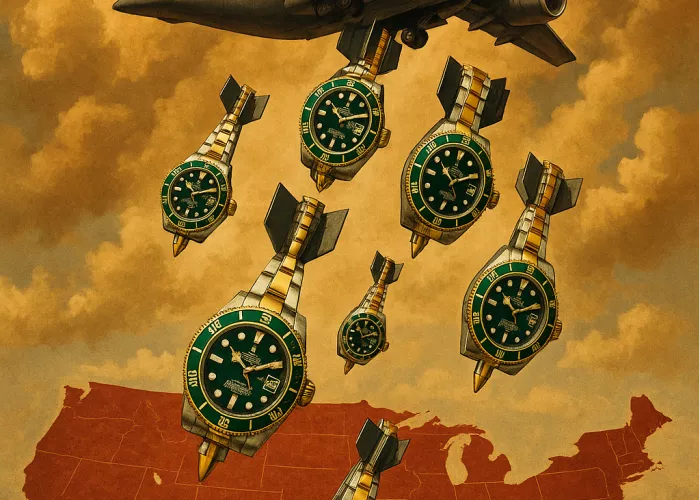American retailers received an unprecedented shipment of Swiss timepieces last month as watchmakers rushed to beat potential new tariffs. Customs data reveals the U.S. imported CHF 852 million worth of Swiss watches in December 2024 – the highest single-month figure on record and more than double the previous year’s December total.
The buying frenzy comes as Washington considers imposing duties of up to 31% on European luxury goods. While the proposal remains under review, industry insiders confirm manufacturers have been airfreighting inventory to U.S. warehouses since October.
Global Market Shifts as Inventory Diverted
The Swiss Watch Federation’s year-end report shows dramatic regional disparities. While U.S. imports soared, shipments to China plummeted 30% compared to December 2023. Hong Kong similarly saw a 23% decline as brands prioritized Western markets.
“These numbers reflect strategic inventory allocation, not organic demand growth,” noted Federation analyst Claude Dubois. “Manufacturers are playing chess with their global stock levels.”
Britain emerged as Europe’s strongest market with CHF 144.5 million in December imports, while Japan and Singapore both outperformed Greater China. Industry sources suggest this rebalancing may continue through Q1 2025.
Retailers Report Unprecedented December
Luxury Watch Barometer data shows U.S. retailers experienced their strongest holiday season since 2021, with the 10,000 segment seeing 35% growth. “We’ve never witnessed December sales like this,” said Manhattan dealer Elena Ricci. “Customers were buying multiple pieces, fearing price hikes.”
The buying spree has left some retailers with depleted inventory. “Our stockrooms are nearly empty,” admitted Chicago boutique owner Marcus Wei. “We’re now waiting to see what happens with both tariffs and 2025 price adjustments.”
As the industry enters the new year, analysts caution that December’s exceptional numbers may represent pulled-forward demand rather than sustainable growth. “This was a perfect storm of factors,” noted Geneva-based industry consultant Jacques Lambert. “We shouldn’t expect it to repeat in 2025.”


